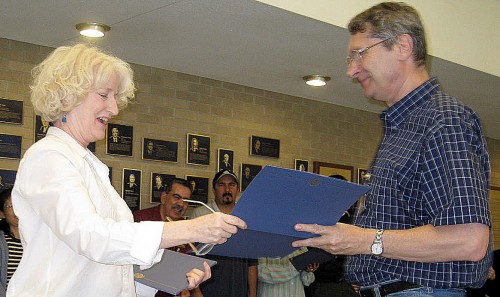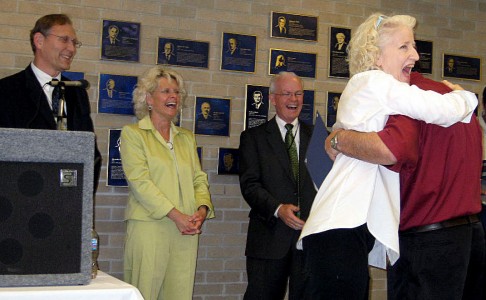Related information below:
- How to register for Adult Ed and ESL classes
- Washtenaw Literacy seeks volunteer tutors
By Casey Hans
AAPSNews Service
There is a new face to Ann Arbor Public Schools Adult Education and lifelong education around Washtenaw County.
Not only can adult learners take classes in a neighborhood public school, but programs are also coming to them at their workplaces and locations such as Mallets Creek branch of the Ann Arbor District Library.

Students can earn a GED, get tutoring in English as a Second Language and find resources for taking college-level classes and transition to job training and employment. The Ann Arbor Public Schools, the University of Michigan Hospitals and Health Centers, Washtenaw Community College, the Washtenaw County Jail and Washtenaw Literacy are all major players in this effort.
AAPS Adult Education Director Sharman Spieser said the collaboration has expanded adult education opportunities throughout the county. “It allows us to offer a deeper and broader range of resources,” she said. “It allows us to personalize it and make it more accessible – to really respect the adult learner’s individual needs.”
Bonnie Truhn, adult transitions manager for Washtenaw Community College, said the partnership solidified with a federal AARA (American Recovery and Reinvestment Act) Grant two years ago, allowing her to serve as a point person to help adults navigate between county resources such as the college, adult education programs and Washtenaw Literacy. Although the grant was not renewed, she has moved into a permanent position with the college and has kept the resources and regional network in place.
Adult students needing assistance with resources throughout the county can still contact her office for referrals and Truhn emphasized the importance of having a countywide presence, since 80 percent of adults served have changed their addresses during the course of their schooling. Truhn said that means students often move from one program to another, depending on their life situation.
Combined resources more efficient
Spieser said the collaboration connects the lines between agencies to offer the best education possible. She said everyone works together to “do more with less,” including Spieser’s role at AAPS, which was moved to part-time this year. The partnerships have helped to keep needed services in place, she said.
For example, classes on popular bus routes, such as those at Stone High School and Mallets Creek Library, and on-site programs at UMHHC and Washtenaw County Jail, allow resources to be efficiently shared.
Washtenaw Literacy and its tutors play an important role in this effort. Executive Director Amy Goodman said the grant coordinated through WCC “was a catalyst for a lot of good things. It really kicked off the partnership and got us a step ahead.”
But the needs continue to grow, Goodman said, making services offered more critical than ever. For example, the waiting list for one-on-one ESL tutoring at WL is 6-9 months and for basic literacy tutoring 3-4 months. “It’s heartbreaking to think that people have to wait this long,” she said.
In addition to the time they devote to one-on-one and group tutoring, Washtenaw Literacy volunteers work with AAPS Adult Ed staff to reinforce instruction with English language and literacy skills at UMHHC and at the county jail.
New grants obtained last year by AAPS Adult Education, with financial support from UMHHC and the Washtenaw County Sheriff’s Department, enable AAPS and Washtenaw Literacy to improve education in the county. This also helps hospital employee retention and increase employment opportunities for students when they are released from jail, Spieser said.
U-M Hospitals and Health Centers finds Adult Ed beneficial
Steve Raymond is Director for Leadership & Staff Development in UMHHC’s Operations & Support Services Department. Raymond has been involved with employee training for much of his career, so the partnership with the AAPS Adult Education Department made sense when he looked into it in 2002.
“I knew there was a need there,” he said. The UMHS started by offering employees an opportunity to get their GED then added ESL classes. They eventually expanded to the work skills initiative.

Last year, Spieser obtained funding for a Targeted Work Skills program she and Raymond developed based on a request from the hospital’s Patient Food and Nutrition Services Department. TWS targets learning in the areas of patient service, communication and cultural competency for PFANS staff – those on the front lines of patient contact including food delivery and patient transport.
Several years ago, the Adult Ed programs were opened to all hospital employees and now touch upwards of 16 departments, Raymond said. At any point in time, there are about 200 UMHS employees taking part in the programs, he said.
“If you give people opportunities, they’ll be more loyal to the organization, more productive, more engaged,” he said. “The bottom line is if it adds value, it’s worthwhile.”
Spieser said that making people’s jobs more meaningful decreases costs by reducing turnover. Giving people access to education and professional growth also adds to the economic health of the community, she added.
These principles also apply at the Washtenaw County Jail, another teaching site, where Washtenaw Literacy tutors and AAPS Adult Education teachers help inmates with reading, math and computer literacy. WCC coordinates GED testing here for students; Spieser said the jail program has an 80 percent test-passing rate. Those who do not complete a GED can transfer directly into GED Prep classes upon release, she said.
Carmelita Samuel, correctional services program supervisor for the jail, said the jail program has expanded in the last two years from one of a basic GED class to pre-GED classes in math and reading and tutoring from Washtenaw Literacy. She said at any given time, there are 20-30 residents on a waiting list for classes.
“It was an important thing for us to do,” she said. “A of them go into crime because of lack of opportunity. That is a common factor,” she said. “Offering education helps give students a path of opportunity. We see this as a very valuable program. The Sheriff’s Department is committed to decreasing recidivism.”
For more information about Adult Education programs in Ann Arbor, visit online or call 734-997-1250.
••••••••••••••••••••••••••••••••••••••••••••••••••••••••••••••••••••••••••••••••••
ESL and Adult Ed enrollment under way
Ann Arbor Public Schools residency is not required to take AAPS Adult Education classes. Details: 734-997-1250 or visit www.aaps.k12.mi.us/adulted.home/home
Registration for the Adult Ed ESL (English As A Second Language) program is scheduled for 9 a.m. to 3 p.m. on Jan. 3, Jan. 4 and Jan. 5 in Room 206 at Stone High School, 2800 Stone School Road (at the southwest intersection of Packard and Stone School Road.) There are a limited number of spaces and registration is on a first-come, first-served basis. Registrants must be 19 years old and have a passport with a visa, green card or Social Security card. Do not bring children; there is no childcare available. Visit the district’s ESL website for details.
AAPS Adult Education’s GED (General Educational Development) Preparation program has ongoing open enrollment and registration from 4-6 p.m. Mondays in Room 206 at Stone School when school is in session. The registration process includes assessment and takes two full hours. Classes are free but registrants must be at least 18 years old to enroll.
Washtenaw Literacy tutors sought
Washtenaw Literacy seeks volunteers to work with adults who need help learning to read. Volunteers are asked to attend a one-hour “ABCs of Washtenaw Literacy” information session. Upcoming sessions are scheduled for Jan. 6, Jan. 10 and Jan. 27 in the evening. Washtenaw Literacy is located in the Ypsilanti District Library at 5577 Whittaker Road. Register for sessions online at www.washtenawliteracy.org or call 734-879-1320.

